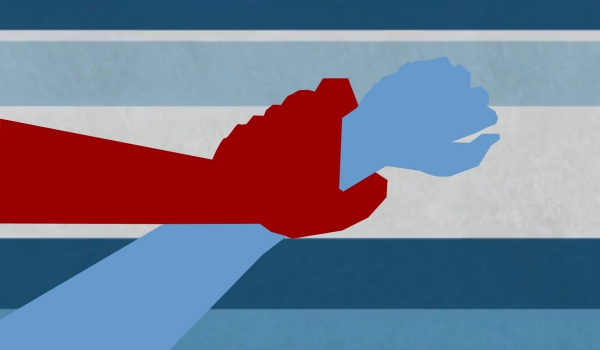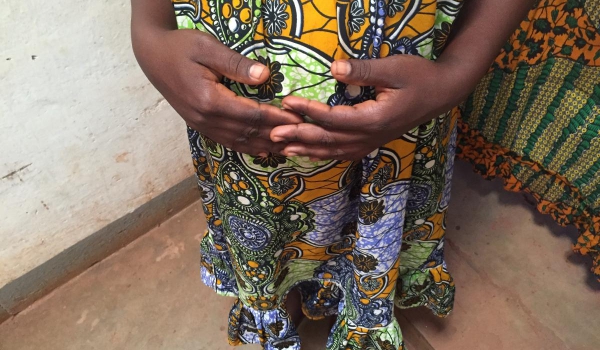Sexual and gender based crimes
Rape. Sexual violence. Sexual slavery. Forced prostitution. Forced pregnancy. Forced sterilization. Gender-based persecution. Trafficking.
Sexual and gender-based crimes (sgbc) are a widespread weapon of war used in conflicts the world over. The ICC is leading efforts to stamp it out.
Perpetrators use sgbc to terrorize, degrade, punish communities and ethnically “cleanse.” Women and girls are targeted most, but men and boys are also affected. Survivors are often marginalized and stigmatized in their communities.
Civil society has been working for many years to safeguard women's rights through strong provisions, policies and prosecutions of sgbc through the ICC and national courts.
Visit the website of Women's Initiative's for Gender Justice, a member of our Steering Committee, for more information.
Definition of sgbc
Gender based crimes are those crimes committed against persons, whether male or female, because of their sex and/or socially constructed gender roles. Gender-based crimes are not always manifested as a form of sexual violence. They may include non-sexual attacks on women and girls, and men and boys, because of their gender.
Sexual crimes are crimes that fall under the subject-matter jurisdiction of the ICC as listed under articles 7(1)(g), 8(2)(b)(xxii), and 8(2)(e)(vi) of the Statute. These crimes include rape, sexual slavery, enforced prostitution, forced pregnancy, enforced sterilization or any other form of sexual violence of comparable gravity.
Gender justice in the Rome Statute system
The Rome Statute is the first international treaty to establish conflict-related sgbv as crimes against humanity, war crimes and, in some instances, genocide. These groundbreaking provisions have provided a new language to describe and prosecute these heinous crimes.
By participating in ICC proceedings, victims can tell their stories in the courtroom. This allows individual women's voices, often overlooked in international prosecutions. That makes its all the more urgent for all states to become ICC members and adopt laws to allow for national prosecutions of sgbc.
In the many situations where the ICC has, or could have, jurisdiction, a lack of (or incomplete) legislation can lead to unwillingness or inability to genuinely prosecute sgbc. National legislation allows governments to increase access to justice and reparation, such as restitution, rehabilitation, compensation, satisfaction and guarantees of non‐repetition.
Civil society calls on states to fully implement the Rome Statute to establish effective mechanisms and legal provisions for the investigation, prosecution and adjudication of sgbc at the national level.
Prosecuting sgbc at the ICC
Recognizing that sgbc are among the most serious crimes under the Rome Statute, the ICC Office of the Prosecutor (OTP) has been prioritizing the investigation and prosecution of the sgbc within the framework of its 2014 Policy Paper on Sexual and Gender-Based Crimes - the first-ever such policy for an international court or tribunal.
In its first cases, the OTP failed to include charges for sgbv crimes (Lubanga) or was forced to drop specific charges for rape and sexual violence (Katanga). Since the development of the OTP policy paper there has been increased focus on charges for sgbc. The trial of Congolese warlord Bosco Ntaganda marked the first time a militia leader faced sgbv charges at the ICC. Militia leader Jean-Pierre Bemba was the first to be convicted of rape as a weapon of war in 2016. And Ugandese warlord Domonic Ongwen has also been charged with sgbv crimes, amongst which sexual slavery.
The sgbc policy provides procedural guidelines for investigating and prosecuting sgbc. It also aims to promote transparency and predictability in the prosecution of such crimes.
The main objectives of the Policy Paper are to:
- Affirm the commitment of the OTP to pay particular attention to sgbc in line with statutory provisions;
- Guide the implementation and utilization of the provisions of the Statute and the Rules of Evidence and Procedure so as to ensure the effective investigation and prosecution of sgbc from preliminary examination through to appeal;
- Provide clarity and direction on issues pertaining to sgbc in all aspects of operations;
- Contribute to advancing a culture of best practices in relation to the investigation and prosecution of sgbc; and
- Contribute, through its implementation, to the on-going development of international jurisprudence regarding sgbc.
- The sgbc policy was created following internal consultations within the ICC, with states parties, international, national and regional organizations, civil society, academics and victim/survivor advocacy groups. Many Coalition members submitted recommendations.
ICC protection of victims and witnesses
The ICC statute and rules offers important protection for victims and witnesses that have suffered sgbc. The Court ensures its procedures are designed to address the specific needs of female victims and witnesses participating in its proceedings.
The ICC is required to protect the safety, physical and psychological well-being, dignity, and privacy of victims and witnesses, with special regard to factors such as their gender and whether the crime involved sgbc. The ICC Victims and Witnesses Unit, housed within the ICC registry, provides protection, security, counseling, and other forms of assistance.
More broadly, the Court can institute measures to protect victims and witnesses during courtroom proceedings. The Court is also required to be vigilant in controlling the questioning of witnesses to avoid harassment or intimidation, especially in cases involving sgbc.
The ICC rules are designed to shield victims of sexual violence from damaging or intrusive attacks on their sexuality or credibility. The Court cannot admit evidence of a victim or witness's prior or subsequent sexual conduct or require corroboration of testimony concerning sexual violence.
The Rules of Procedure and Evidence outline principles to guide the Court in handling sexual violence cases, making clear that a victim's consent cannot be inferred where the perpetrator took advantage of a coercive environment (such as a detention center), and requiring special procedures for presenting evidence of consent to acts of sexual violence.
Sgbc expertise
The Rome Statute requires that the ICC prosecutor appoint advisers with legal expertise on sexual and gender violence. The Court's victims and witnesses unit include staff with experience in trauma related to sexual crimes.
The Statute also requires states, in electing judges, to take into account the need for "fair representation" of female and male judges, and requires that the prosecutor and registrar do the same when hiring staff. The Coalition calls on the ASP to consistently elect officials that have a gender justice expertise.






